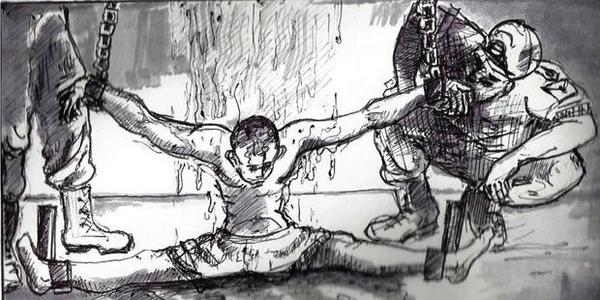 An encounter with the Nigerian security forces can be a dangerous thing.
An encounter with the Nigerian security forces can be a dangerous thing.
The police and military routinely engage in beating people in their custody with whips, gun butts, machetes, batons, sticks, rods and cables. Rape and sexual assault are widespread Detainees can be shot in the leg, foot or hand during interrogation, or have their nails or teeth extracted with pliers.
They can be suspended upside down by their feet for hours; tied to a rod by their knees and elbows and suspended as on a roasting spit; starved: or forced to sit, lie or roll on sharp objects, such as glass or a board with nails. The security forces use electric shocks, sometimes administered to the genitals; water torture; or, when they run out of ideas, they choke their charges until they faint.
Take the case of Moses Akatugba who was just 16 when he was arrested and tortured in Nigeria. He reports being beaten by the police, shot in the hand, and hung for hours at the station. Moses asserts his innocence, stating he only signed a confession agreeing he was involved in a robbery because of the torture to which he was subjected. In November 2013, after eight years of waiting for a verdict, Moses was sentenced to death.

In the northern part of the country where the security forces have been given free rein to crush the armed group Boko Haram, over 5,000 people have been detained by the security forces and many have been subjected to torture or ill treatment. The main reason that the region of Nigeria more frequently associated with human rights abuses by the security forces, Nigeria’s Niger Delta, appears quiescent these days, is an amnesty deal between the government and armed minority groups in the region that expires next year.
Nigeria is a party to several international and regional human rights standards which prohibit torture. Indeed, the Nigerian constitution, which prohibits torture and ill treatment, is one of the few in Africa that actually incorporates the African Charter on Human and Peoples Rights into its text. Despite this, the country has not criminalized torture: the legislation that would accomplish this has languished in the Nigerian parliament for 2 years, and it has been 7 years since the UN Special Rapporteur on Torture found that torture had become an “intrinsic part of the functioning of the police in Nigeria,” and recommended that torture to be criminalized.
During its research documenting the scale and scope of torture in Nigeria, Amnesty International found a cavalier attitude toward torture that resulted on one detention facility being named “Guantanamo,” and the use of an unofficial designation of “O/C Torture” to denote the Officer in Charge of Torture in some Nigerian police stations.
There are some key initial first steps that must be taken:
- The Nigerian National Assembly must pass a bill that criminalizes the use of torture without further delay.
- Human rights monitors must be granted access to previously inaccessible detention facilities run by security forces (especially those run by the Joint Task Force) and increase monitoring visits to detention facilities run by the police, military and State Security Service (SSS).
- The Chief of Defence Staff must issue a public statement, stating that individuals in military detention are entitled to access to a lawyer and,
- All those in detention must have increased access to lawyers, families and independent monitors while in police, military or SSS custody.
With Nigeria slated to be a major partner in President Obama’s US$5 billion counter-terrorism initiative, either the US government knows something that the rest of the world is not aware of vis-à-vis US legal obligations not to provide security assistance to military units that have committed human rights abuses, or the performance of the military is going to be “overlooked” due to overriding national security concerns. The former raises questions of judgement and the latter raises questions of principle and the United States’ commitment to the rule of law, human rights and accountability beyond PowerPoint presentations in Washington DC. For the people living in Nigeria with these security forces, neither scenario holds much hope.
We must take action and fight for Moses
But we must also press the Nigerian government to take action and to stop torture or else there will be thousands more Moses all over the country.
